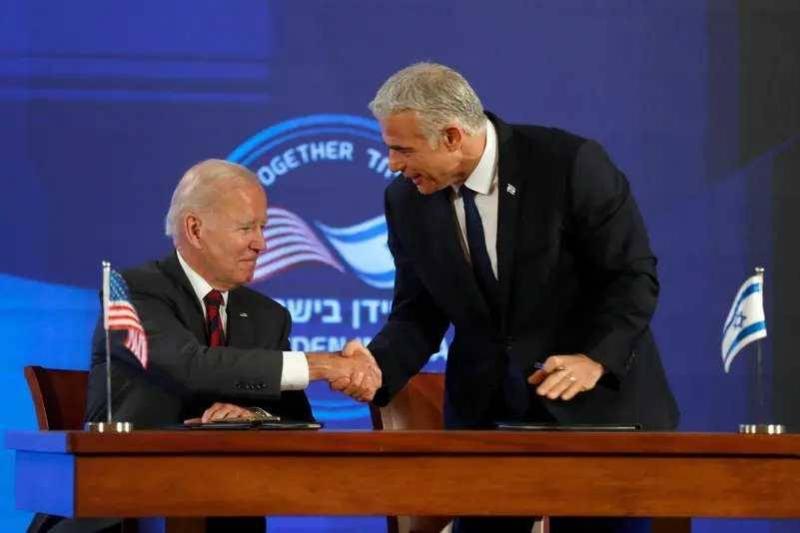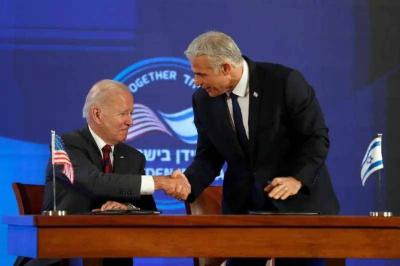U.S. President Joe Biden intensified his discussions with Israeli leaders following his arrival in Israel, covering pressing issues, and signed the "Jerusalem Declaration" which solidified the cooperation between the United States and Israel. On the second day of his visit, Biden met with new caretaker Prime Minister Yair Lapid, and the meeting concluded with both parties signing the "U.S.-Israeli Declaration."
During the signing, the United States reaffirmed its commitment to Israel's security and deterrence capabilities. The declaration emphasized Washington's commitment to deterring Iranian nuclear threats and preventing Tehran from acquiring nuclear weapons. It stated that the U.S. would use its power to ensure Iran does not possess nuclear arms and clarified that Washington is dedicated to working with allies to confront Iranian aggression.
The U.S.-Israeli declaration, the first of its kind in two decades, underscored that Israel's security is vital to U.S. interests and constitutes a foundation for regional security. It established cooperation in advanced defense technologies as a significant focus of the agreement, including collaboration on high-energy laser weapon systems for Israel's defense.
Moreover, the declaration expressed both nations' aspirations to expand the circle of peace with more Arab countries and noted that this partnership benefits not only the U.S. and Israel but also the Middle East and the world at large. It reaffirmed the importance of peace agreements for the region's security and stability and welcomed the Negev Forum for regional cooperation.
In a joint conference with U.S. President Joe Biden, Lapid asserted that "force must be a last resort to protect our security," indicating that "diplomacy alone is insufficient to stop Iran," while stressing the need for a military threat to halt Iran's nuclear program development. Lapid stated, "We extend our hand to those who seek peace in the region."
Similarly, Biden reiterated that "Iran will never obtain nuclear weapons," asserting that "diplomacy is the best way to prevent Iran from acquiring nuclear arms." He added, "We will not wait forever for Iran to respond regarding the nuclear talks," and emphasized that "Iran must be prevented from arming terrorist organizations, including Hezbollah." He continued, "We strive to achieve security and stability in the Middle East... and integrate Israel into the region." He remarked, "Our withdrawal from the region left a void that China has exploited."
A correspondent for "Al Arabiya" and "Al Hadath" reported that Lapid discussed with Biden the formation of a regional alliance to counter the threat posed by Iran. During their meeting, Biden reaffirmed America's commitment to Israel's security while Lapid expressed his opposition to returning to the nuclear deal with Iran. According to a statement from Lapid's office following the meeting, he called for intensified pressure on Iran to return to the negotiating table for a new agreement. Lapid thanked President Biden for his decision not to remove the Iranian Revolutionary Guard from the list of terrorist organizations.
It is notable that last year, while serving as Foreign Minister, Lapid announced his desire to rebuild bridges between Israel and the American Democratic Party after years of Donald Trump and Benjamin Netanyahu in power. A senior Israeli official noted earlier that the "Jerusalem Declaration concerning the strategic partnership between the United States and Israel" would serve as a "living testament to the unique nature, truth, extent, depth, and warmth" of this bilateral relationship.
He added that the document, which has not yet been formally dubbed the "Jerusalem Declaration" by the Americans, would express a "clear and unified stance against Iran and its nuclear program and its aggression throughout the region."
The approach to the Iranian nuclear file remains a source of divergence between the United States, which wishes to pursue a diplomatic path through reviving the 2015 nuclear deal (Joint Comprehensive Plan of Action), and Israel, which advocates for a hardline stance. The Trump administration withdrew from the nuclear agreement in 2018 and reinstated sanctions on Tehran as part of a "maximum pressure" campaign on the Islamic Republic.
In an interview with Israeli Channel 12 on Wednesday night, President Biden stated that "the previous president's withdrawal from the agreement was a grave mistake, as it brought the Iranians closer to obtaining nuclear weapons than they were before." In response to a question about whether he would be prepared to use force to ensure Tehran does not acquire nuclear weapons, Biden replied, "Yes, if that is the last resort."
Israel fears not only that Iran could obtain a nuclear bomb, a claim Tehran denies, but also worries that lifting sanctions could fill Tehran's coffers with money, enabling increased support for its regional allies, such as Hezbollah and Hamas.
Biden will also meet with Israeli President Isaac Herzog on Thursday, who will award him a "Medal of Honor" for his support of Israel, before heading to cheer on American athletes participating in the Maccabiah Games, a Jewish sports event organized every four years in Israel.
Finally, as is customary for a U.S. president and while Israel is in the midst of a campaign for early legislative elections scheduled for November 1, the Democratic president will conclude his meetings in Israel with talks with the opposition represented by former Prime Minister Benjamin Netanyahu, whose relationship with Biden has often been characterized by coolness. This visit marks Biden's tenth trip to Israel, but his first as president.




